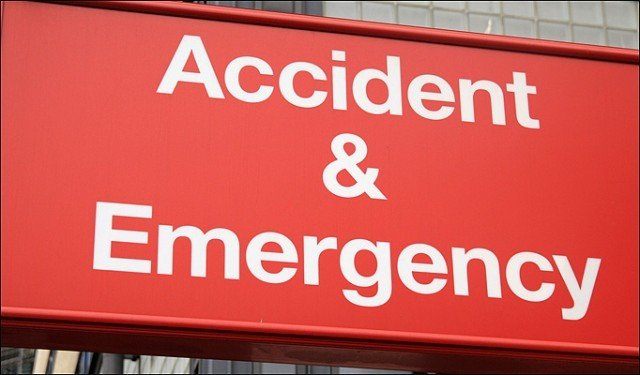The NHS is straining under the weight of demand, leaving patients queuing before dawn to get an appointment with their doctor, others being offered quick-fire two minute appointments, and hospital patients left on trolleys for up to 12 hours in A&E as no beds can be found on wards.
Yesterday, London Mayor Boris Johnson urged people with minor injuries to call taxis to take them to hospital rather than call on the ambulance service, while enquiries by the Daily Mail have revealed that elderly patients are being left on hospital wards needlessly for up to a year, blocking beds and further exacerbating the crisis.
All in all, the picture emerging is not that of a Health Service which is the envy of the world, as the NHS’s supporters maintain, but a Health Service struggling to meet demand, leaving patients with no-where to turn for vital health care thanks to the ongoing suppression of meaningful competition. Fewer than 4 million Britons have any sort of private health cover at all, down from 4.2million in 2009, and no policy covers emergency medicine or general practice.
Gordon Miles, chief executive of the College of Emergency Medicine (which represents A&E doctors) told the Mail: “It’s very challenging at the moment. Last week was one of the worst weeks for a long, long time.
“We’re expecting it to be very busy over Christmas. It doesn’t show any sign of a let-up. If a hospital is bunged up with people who can’t be discharged, patients will have to wait on trolleys or in ambulances outside.”
Dr Mark Porter, chair of the British Medical Association’s council, was in agreement, saying: “GP services are under unsustainable pressure, hospitals are full and investment in adult social care has been slashed.”
Yesterday Breitbart London reported how patients at one doctors’ surgery in leafy Sunbury-on-Thames, Surrey, are having to get in line before 7am just to see a GP. As phone lines don’t open until 8.30am, those too ill to wait in line in the December cold are unlikely to get any remaining appointments. The surgery was originally designed to service 6,000 people but has 19,000 patients on its books.
Meanwhile, another unnamed GP surgery was offering two minute appointments in an effort to see everyone before Christmas. The situation came to light when a doctor tweeted an image of their appointments sheet showing the backlog.
And in hospitals, the situation is no better. Yesterday, Boris Johnson urged Londoners to call a taxi instead of an ambulance for minor injuries. He added: “The London Ambulance Service is doing an incredible job responding to Londoners at an increasingly busy time of year.
“That demand puts huge pressure on the men and women in the front line, emergency service operators, paramedics, ambulance technicians, police officers, firefighters and staff on our public transport network.
“Over the festive period and across the winter I know the public will heed the emergency services calls for restraint when it comes to calling an ambulance.”
There is currently a national shortfall of ambulance staff, of around 3,000 workers, causing bosses to look for staff abroad. London Ambulance Service has hired 175 Australian paramedics to start in January, whilst South Central Ambulance Service, which covers Berkshire, Buckinghamshire, Hampshire and Oxfordshire, is looking to Poland to fill vacancies for 220 paramedics and technicians and 70 emergency care assistants.
A spokesman for the South Central Service said “We have been carrying out some international recruitment in Poland for paramedics where their qualifications, skills and experience are very similar to our own and meet our own high standards for staff.”
Last week, hospital A&Es logged their worst week on record, with fewer than 90 percent of patients being seen within the target time of four hours. And those who are seen and need to be admitted regularly end up waiting on trolleys for hours whilst waiting for a bed to become available. Figures from last month showed that more than 29,000 patients were left on trolleys for more than four hours – and 26 were forced to wait for more than 12 hours.
Yet elderly patients are being kept in beds on wards unnecessarily, some for up to a year at a time, as there is nowhere else for them to go. A Labour Freedom of Information Act request revealed that 26 patients blocked beds for more than three months in 2013/14, with one patient residing at the United Lincolnshire Hospitals trust for 365 days, and another staying at York Teaching Hospital for 329 days.
In both cases, the reason recorded was “patient or family choice”. Cases have been recorded in which relatives demand hospitals take care of their elderly relatives whilst they go on holiday, and even in one case because they didn’t like the curtains at the care home on offer.
Commenting on the situation at large, a Department of Health spokesman said: “These figures give a misleading impression – while long waits to be discharged are unacceptable, there are actually fewer as a proportion of hospital admissions over the last few years.
“We know the NHS is busier than ever which is why we’ve given it an extra £700million for thousands more doctors, nurses and beds this winter. The NHS has ensured there are plans in every area to manage extra demand.”

COMMENTS
Please let us know if you're having issues with commenting.